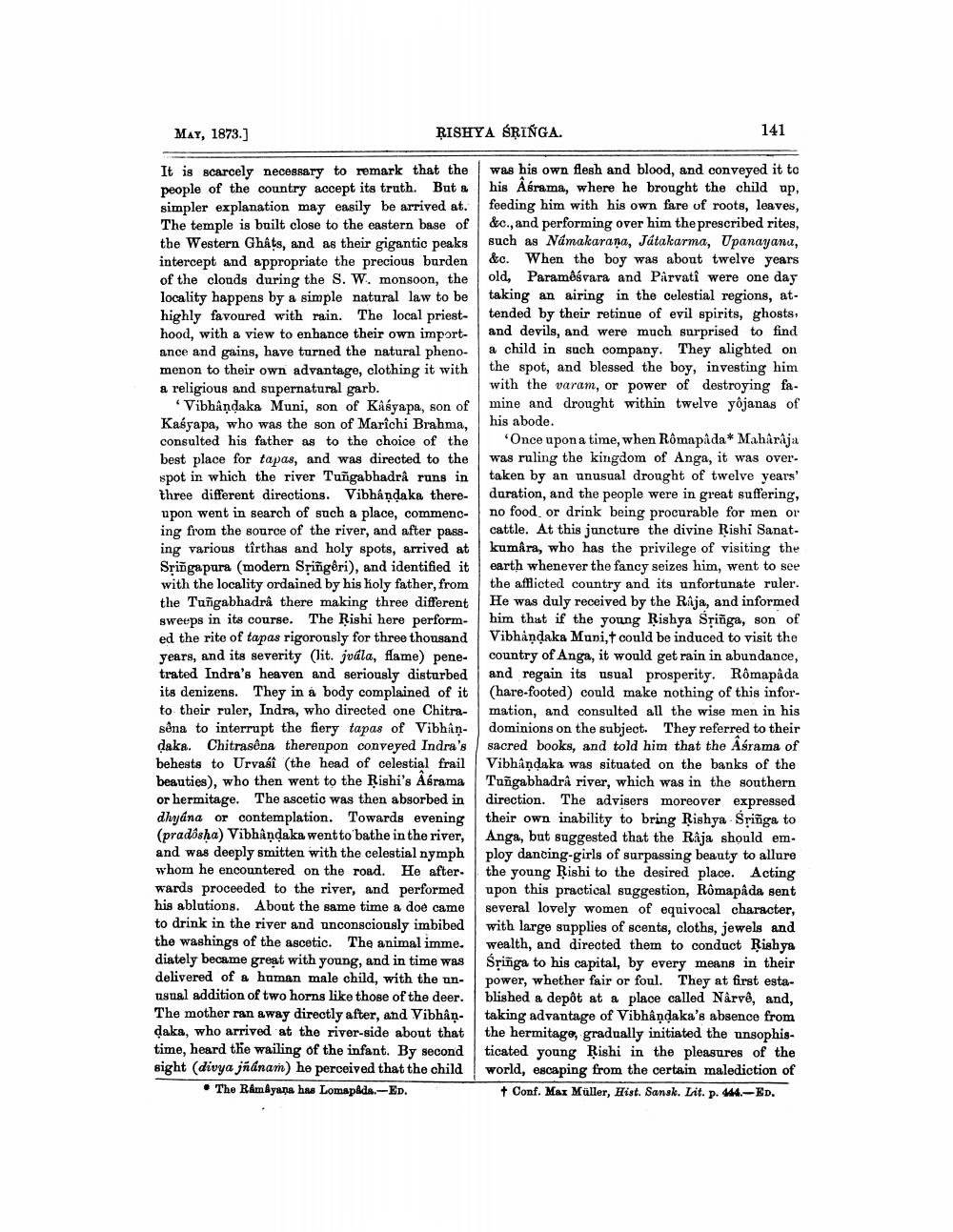________________
MAY, 1873.]
RISHYA ŠĶIŃGA.
141
It is scarcely necessary to remark that the was his own flesh and blood, and conveyed it to people of the country accept its truth. But his Asrama, where he brought the child up, simpler explanation may easily be arrived at. feeding him with his own fare of roots, leaves, The temple is built close to the eastern base of &c., and performing over him the prescribed rites, the Western Ghâts, and as their gigantic peaks such as Nánakarana, Játakarma, Upanayana, intercept and appropriate the precious burden &c. When the boy was about twelve years of the clouds during the S. W. monsoon, the old, Paramêśvara and Parvatî were one day locality happens by a simple natural law to be taking an airing in the celestial regions, athighly favoured with rain. The local priest- tended by their retinue of evil spirits, ghosts, hood, with a view to enhance their own import- and devils, and were much surprised to find ance and gains, have turned the natural pheno- a child in such company. They alighted on menon to their own advantage, clothing it with the spot, and blessed the boy, investing him a religious and supernatural garb.
with the varam, or power of destroying faVibhandaka Muni, son of Kasvapa, son of mine and drought within twelve yojanas of Kaśyapa, who was the son of Marichi Brahma,
his abode. consulted his father as to the choice of the "Once upon a time, when Rômapida* Maharaja best place for tapas, and was directed to the was ruling the kingdom of Anga, it was overspot in which the river Tuñgabhadrâ runs in taken by an unusual drought of twelve years' three different directions. Vibhándaka there- duration, and the people were in great suffering, upon went in search of such a place, commenc- no food or drink being procurable for men or ing from the source of the river, and after pass- cattle. At this juncture the divine Rishi Sanating various tîrthas and holy spots, arrived at kumara, who has the privilege of visiting the Sriñgapura (modern Sriñgêri), and identified it earth whenever the fancy seizes him, went to see with the locality ordained by his holy father, from the afflicted country and its unfortunate ruler. the Tuñgabhadrâ there making three different He was duly received by the Raja, and informed sweeps in its course. The Rishi here perform- him that if the young Rishya Spiñga, son of ed the rite of tapas rigorously for three thousand Vibhåndaka Muni,t could be induced to visit the years, and its severity (lit. jvála, flame) pene- country of Anga, it would get rain in abundance, trated Indra's heaven and seriously disturbed and regain its usual prosperity. Rômapada its denizens. They in a body complained of it (hare-footed) could make nothing of this inforto their ruler, Indra, who directed one Chitra- mation, and consulted all the wise men in his sôna to interrupt the fiery tapas of Vibhin. dominions on the subject. They referred to their daka. Chitrasena thereupon conveyed Indra's sacred books, and told him that the Asrama of behests to Urvasi (the head of celestial frail Vibhandaka was situated on the banks of the beauties), who then went to the Rishi's Asrama Tuñgabhadrâ river, which was in the southern or hermitage. The ascetic was then absorbed in direction. The advisers moreover expressed dhyána or contemplation. Towards evening their own inability to bring Rishya Sriñga to (pradôsha) Vibhåndaka went to bathe in the river, Anga, but suggested that the Raja should emand was deeply smitten with the celestial nymph ploy dancing-girls of surpassing beauty to allure whom he encountered on the road. He after the young Rishi to the desired place. Acting wards proceeded to the river, and performed upon this practical suggestion, Rômapâda sent his ablutions. About the same time a doe came several lovely women of equivocal character, to drink in the river and unconsciously imbibed with large supplies of scents, cloths, jewels and the washings of the ascetic. The animal imme. wealth, and directed them to conduct Rishya diately became great with young, and in time was Spiñga to his capital, by every means in their delivered of a human male child, with the un- power, whether fair or foul. They at first estaugnal addition of two horns like those of the deer. blished a depôt at a place called Nårvê, and, The mother ran away directly after, and Vibhân. taking advantage of Vibhåndaka's absence from daka, who arrived at the river-side about that the hermitage, gradually initiated the unsophistime, heard the wailing of the infant. By second ticated young Rishi in the pleasures of the sight (divya jnanam) he perceived that the child world, escaping from the certain malediction of • The Ramayana has Lomapada.-ED.
+ Conf. Max Müller, Hist. Sansk. Lit. p. 144.- ED.




